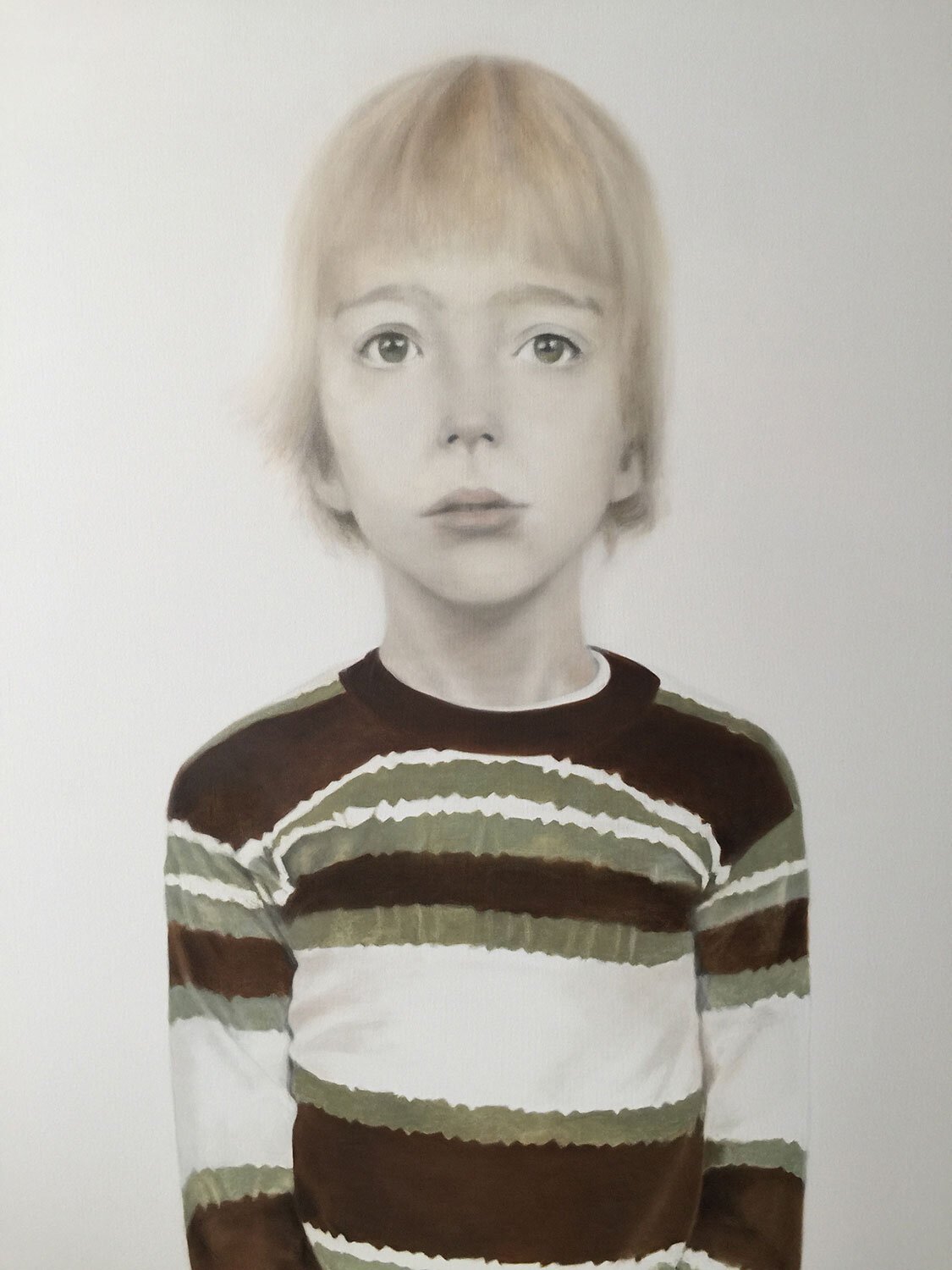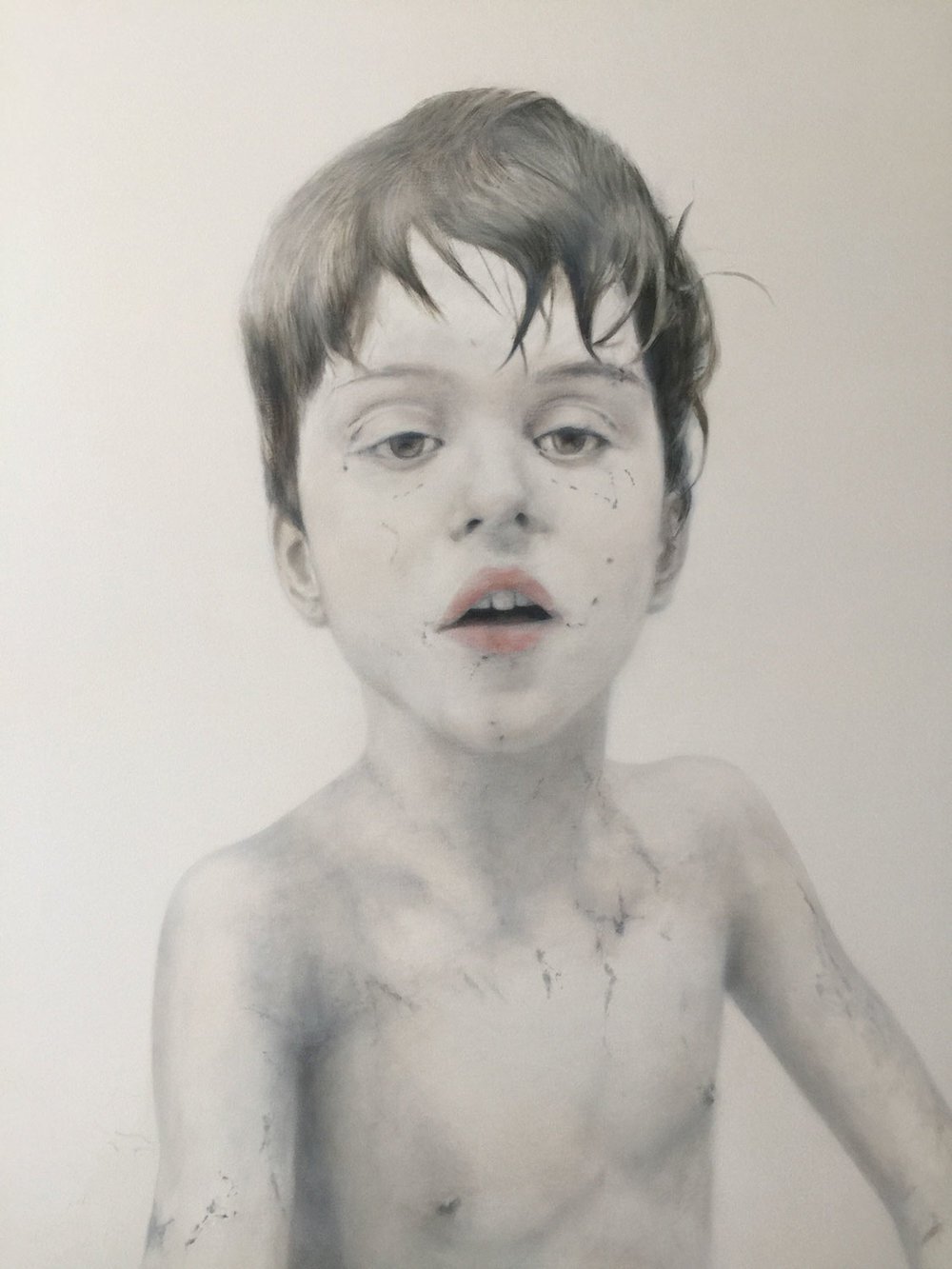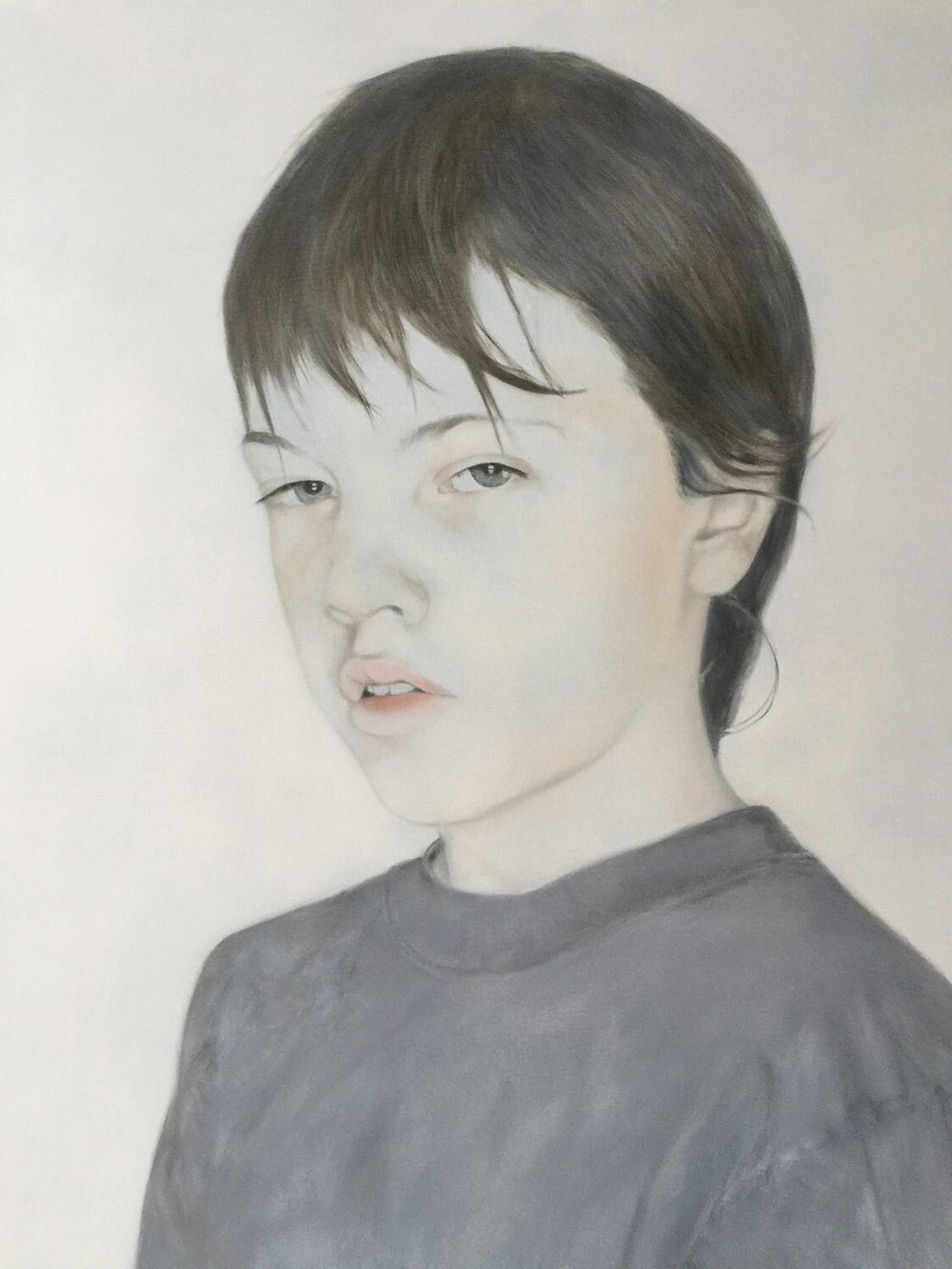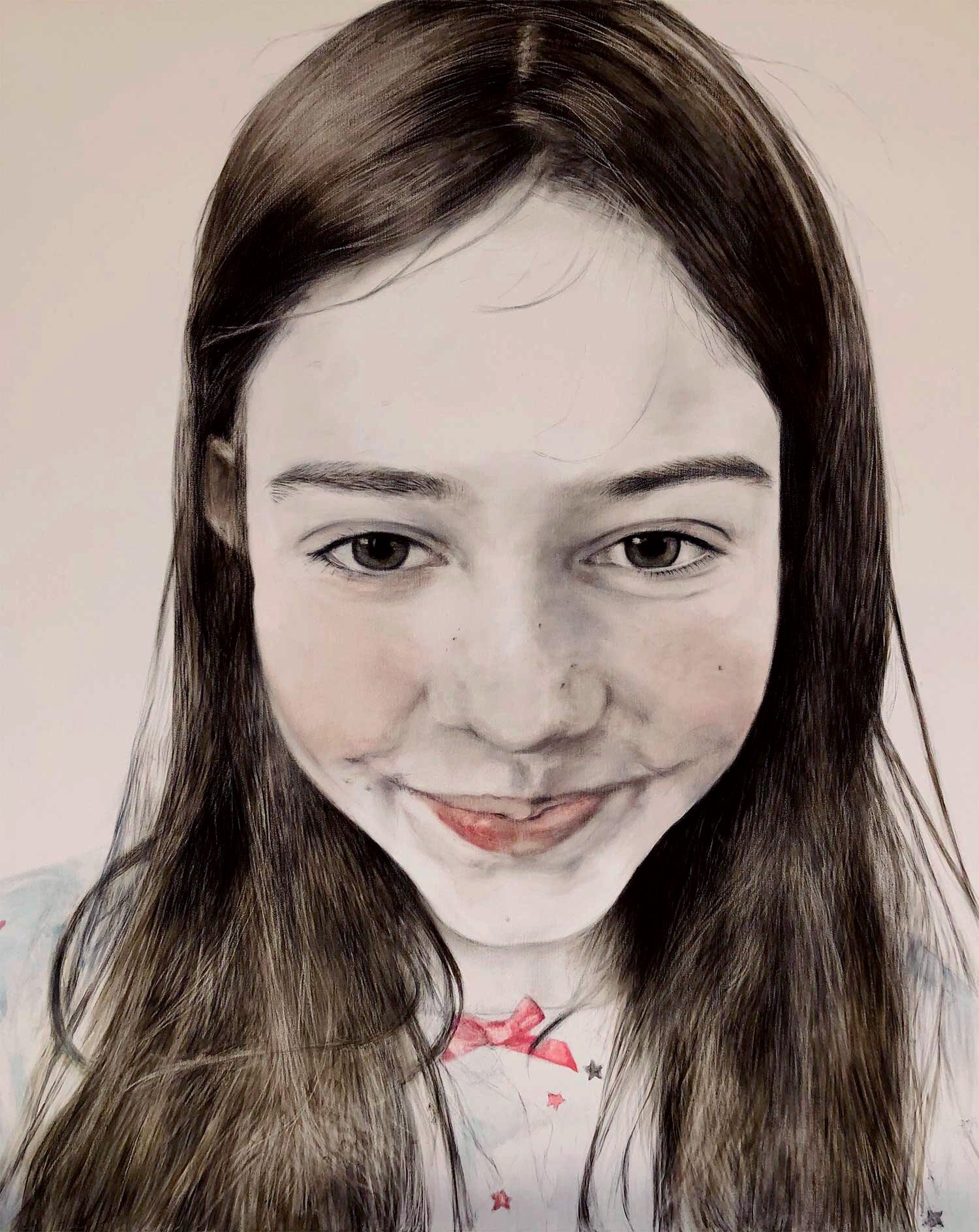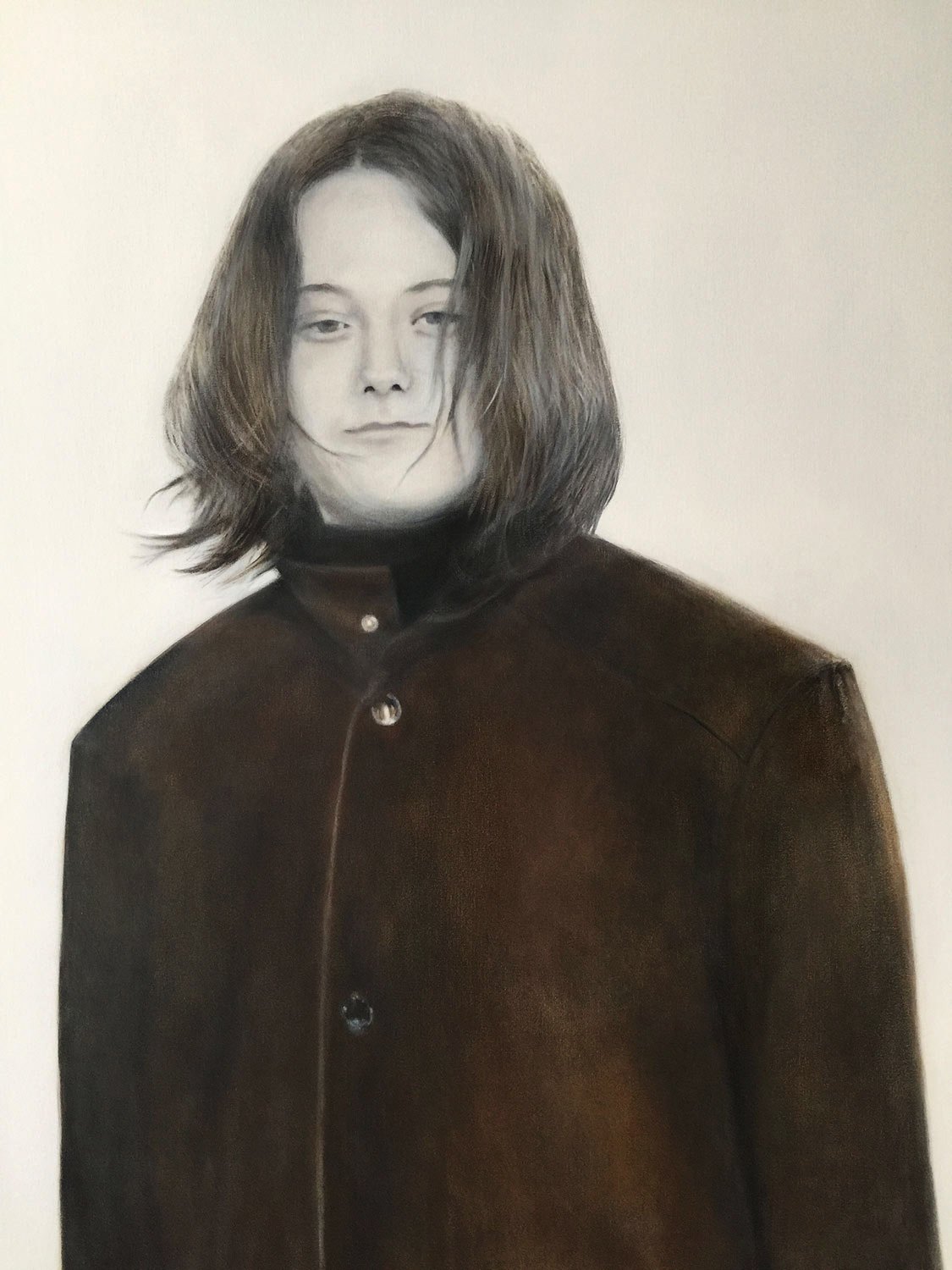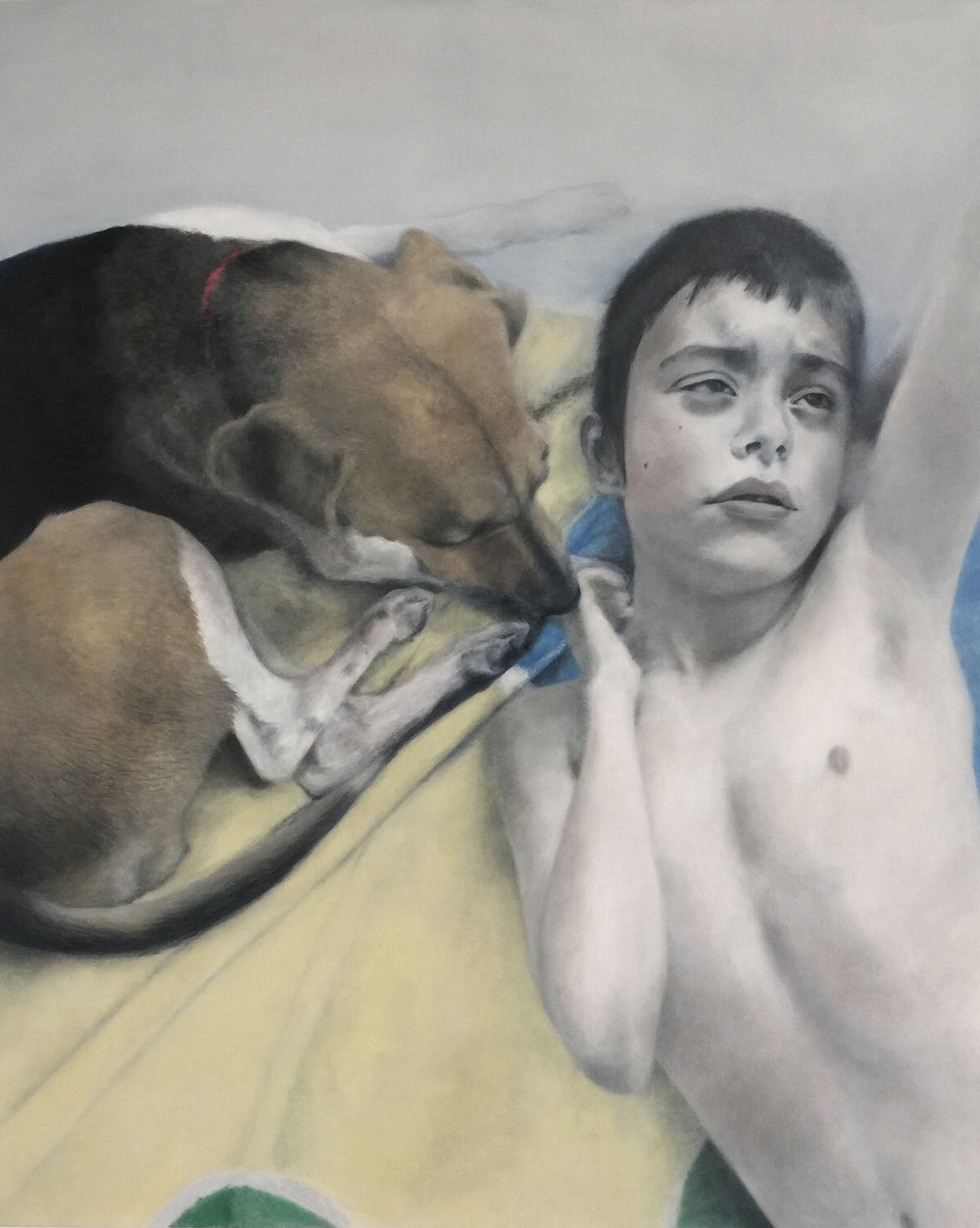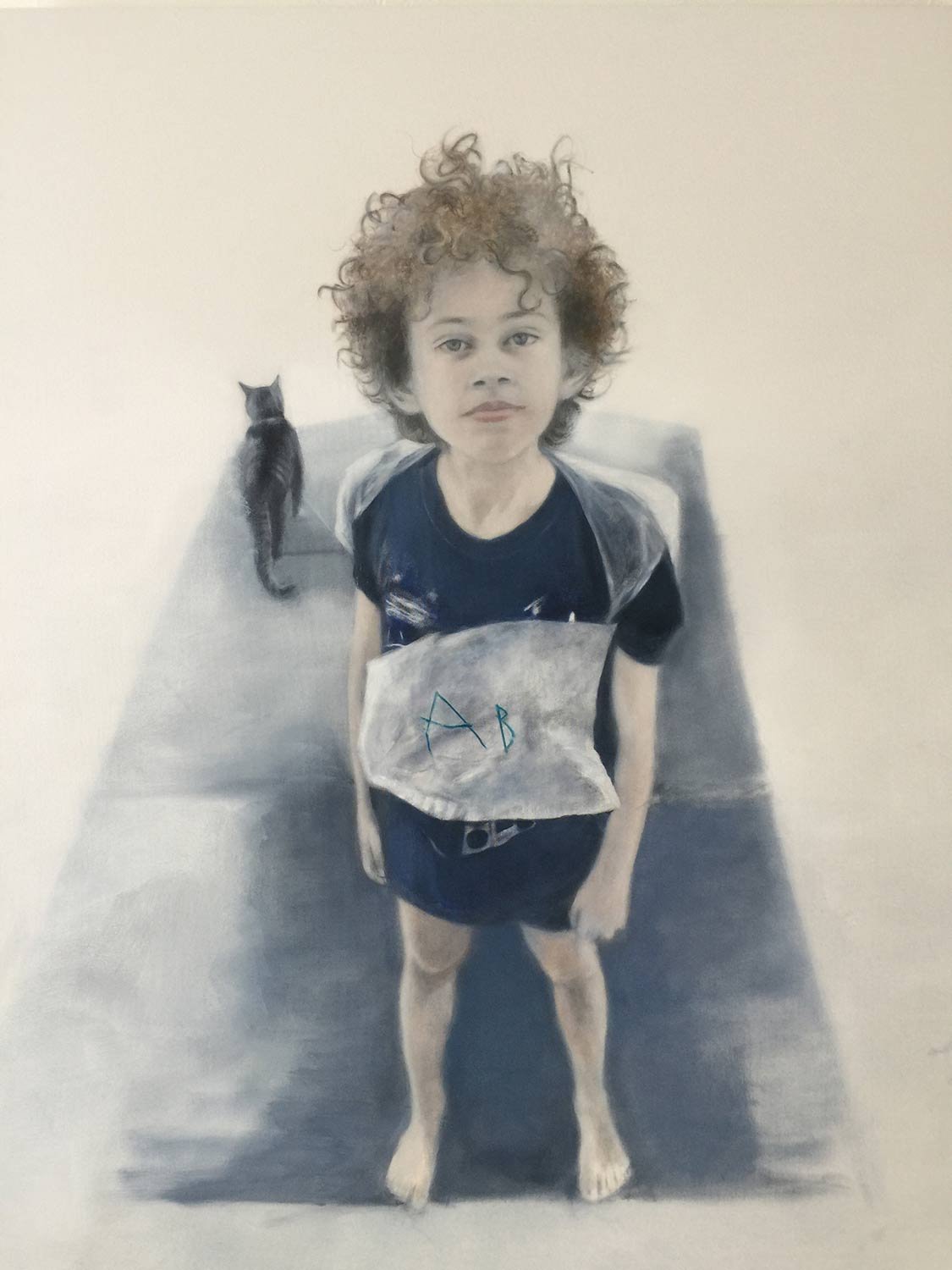
Portraits of Autism
Using Visual Art as a platform "Portraits of Autism" seeks to create social awareness while opening up a discussion about available support systems and funding for families caring for both children and adults diagnosed with Autistic Spectrum Disorder (ASD).
The focus of each portrait is to bring awareness to autism as well as to provide an emotional experience and public connection to each subject as a unique individual who is not only defined by their “disability”.
Buddha
Buddha born 2006, lives in Mountain Center, CA with his mother Kaarin Elizabeth, and his service dog. Buddha has two older adult siblings Wolfgang and Elizabeth who are also on the spectrum. Buddha is non verbal.
Buddha at Ten With Service Dog Mouse, 2017 Oil on canvas 42x52”
They call me Superwoman even when I choke on chips
By Kaarin Elizabeth, 2015
Today was hard.
There is this nerve,
That starts under my shoulder,
And, goes to the top of my neck.
It is on fire!
A pain I can not ignore,
It’s there,
Because today,
My son,
Needed to be held tightly,
At my discomfort,
For three hours.
He was scared,
Because, he knew, if I let go,
He would not be able to stop himself.
His brain, that is also on fire,
Will drive him,
To throw books, to hit things, to hurt people.
It is a disability,
No one can see,
But me,
Not even the doctors and their precious machines.
But I see it, I know it, I live with it, I have made it my own.
Because,
I am the one, who held this precious baby,
And counted the minutes, as he turned blue, and
Convulsed uncontrollably, sometimes violently.
Because,
I am the one,
Who begged,
Who pleaded,
And sat through sleepless nights,
In cold hospital rooms.
Because
I am the one,
Who watched his hair thin out,
When they glued electrodes,
To his newborn head,
Just so they could send us home, telling me,
It was my imagination.
Because I am the one,
Who finally proved to them,
They needed to help him,
Before the seizures,
Left him for dead.
Because
I am the one,
Who watched them roll in a crash cart,
Before they gave my fragile baby,
His first medicine
And
I am the one, Who rocked him for hours,
When the medicine made him sick, and,
Still didn’t quiet the lightning storm in his head.
And I am the one,
Who jumped for joy when he eat sand,
Because it meant he was finally exploring.
And, I am the one,
Who cleaned his poo from the walls,
Making sure I complimented him on such unique and imaginative art.
And I am the one,
Who sees his struggle,
When he can’t stop,
Trying to hurt everyone,
Trying to tell them, with no accessible words, that he hurts too.
And I am the one,
Who finally found the word Autism.
And although these educated people who continued to ignore me were all around,
I brought that word to everyone, so they could understand, they might be able to help him,
That I refuse to give up on him.
And, Because I am the one, Who knows he is in pain, that his brain is on fire,
And that he can’t tell anyone, because that is what nonverbal means.
And,
I am the one,
Whom, no matter how angry, how sick, how tired,
Will always dream the possibility,
That one day the fire will stop, and he will say
“I love you too mom”
KEIR
Born January, 1992
Until the age of 32, Keir was cared for by his father in the family’s home with support from the state programs available in Madison, Wisconsin. Scot, Keir’s father, was paid a minimal amount by the hour for a set number of hours per week to provide care for his son in the family home. Because of Keir’s aggressive behavior, Scot is the only one physically strong enough in the family to care for Keir’s needs. Ruby, Keir’s mother cares for their young adult son Aticus who is also on the spectrum. For many families the option to send their autistic child to a group home or some other type of institution (if even available) is heartbreaking and not an option they are willing to consider as their child “ages out” at 21 when access to Federally mandated funding is discontinued.
Recently, Keir was approved for a group home with two on one services just a few miles from the family home.
”Post pandemic Kier was becoming a little tough for Daddy to handle 24/7. The same Teddy bear 90 percent of the time, but more and more a daily time bomb going off once or twice a day. Younger sister Antigone came home Christmas eve -- I told her to give Kier a little room (she loves him to death and is usually the one she greets first). I go to check on Kier and he kind of tackles me and I wrestle him back to his room. I come back to the kitchen -- Antigone is crying, she stands up and says the never before thought of notion in our family "Dad you can't do this anymore! That's what it took to get that ball rolling. Everybody worried whether Daddy was going to be able to handle it -- but one of the many lessons Kier has taught me -- "whatever it takes to make it work." It is working -- nice place just a few miles away. A group home a woman with her husband runs. Kier got approved for 2 on one services. It's working! I think he has gotten accustomed to the new "routine" and is the same Kier. I got them to answer the Ipad every couple of nights and we do a video call with him -- he seems to get a kick out of that. And Ruby and I try to make a visit once a week. Long answer to a short question, but of course love your interest in that world.”
-Scot
Keir at Ten, 2017 Oil on canvas 42x54”
Autism / The Bullfight
By Scot Vee Gamble
You did not choose to be this matador.
The stadium surrounding our lives together is all din and glare. Medicine and science prance around the ring like feeble picadors.
For us no glory in the bloodied sand beneath our skittery feet.
But at times your dance and sway distracts the relentless bull.
You are the grace of angels and the power in purity.
The red cape will always bear my name.
And when push comes to hug we will stand together. In the end, that may be enough.
One day the bull will charge no more and we will toss our hat to a cheering crowd.
FINN
Finn Born September, 2007 was excepted into a residential placement (age 10) at The New England Center for Children a school for children with autism located 20 miles west of Boston in Southborough, Massachusetts. Finn's mother Alysia, father Jeff and older sister Annabel spend time with Finn off campus and in the family home.
Fiinn at Nine, 2017 Oil on canvas 42x54”
Life with my brother
By Annabel Abbott Howe
(Age 12)
Stress, my brother was like a hovering raincloud
Raining bites
Lightening bites
Thundering pinches
To scar ones heart
Love, my brother was like an innocent alien
loving everyone,
Curious at the things you pass by
Happy when the world is not
To repair ones heart
But we could not control the raincloud
Goodbye brother
Life without my brother
Monday, Skype
I see my brothers face stuck on the screen, talk with no reaction
Like a distant memory
Talking to nothing
Hoping…
Sunday, a visit to his new home
I want to embrace him but my heart doesn't allow it
Stuck in a room
Watching love bottled up
Waiting…
Next Sunday, He visits his old home
I don’t listen to my heart I embrace him finally being his sister
Leading him through his old world
Feeling the joy of the alien
Loving…
Hello brother
EDDIE
Eddie born May, 1970 lives in Friends of Good Shepherd Manor a residential care facility in Lucasville, Ohio. Originally a Catholic facility, it is now privately run through funding from Medicaid. Eddie’s older sister Lynette recently has taken guardianship over Eddie. For many families raising a child on the spectrum there is a persistent fear and concern for their child’s future. This becomes increasingly disconcerting as parents begin to look at the reality of what may happen when they are no longer alive or become incapable of caring for them.
Eddie By Helen Dovenbarger
How do you live with an adult child who has profound developmental disabilities?
To try to answer this question, I must look at what brought me here. I prefer to look at the past in stages.
The first stage is the diagnostic stage. Born a beautiful little blonde boy, we thought he was perfectly normal. After a few months, we suspected this was not to be true. So began the search for diagnosing. After almost a year and a half of searching for answers, we finally learned he had Autism. It would take us many more months to fully realize the extent all that this meant and the impact it would have on our family.
So began, “ living with and loving this sweet boy who has many limitations and accepting him as he is” stage. Hours of entire family teaching him most basic skills was challenging and, at times, frustrating. Although, he never learned verbal skills, he has learned to feed himself, became potty trained and learned some basic control over his own environment, many times while screaming in resistance. Left alone, he could entertain himself for hours while sitting on the floor and spinning a plastic bowl, or just screaming. He did not like to be touched or held, but we continued to try because we all loved him. Eventually, he began to understand ( I think ) that we were going to continue to touch and hold him , so we started into his routine - touch and hold me on my terms and when I want you to. Life became easier.
The next stage was looking for school and other services so he could live as normal a life as possible. He went to
“special school“ from 4 years old until he was 22, when he could no longer attend school in our state. Things went relatively well until he reached puberty. At 13 he began having seizures ( some life - threatening ) and his behavior became very violent at times - hitting, screaming, knocking pictures off walls, putting holes in walls, turning over furniture, and going many nights without sleeping at all - at times, screaming all night. We found a Doctor , who, after years of searching for the right medications to control seizures and behaviors, he found the right combination. At 21, when the seizures were mostly under control, the behavior improved and he once again was our sweet boy.
When he could no longer go to school, and I had my terminally ill Mother living with us, and the 2 older children were grown and away from home ( they were wonderful with him and so helpful ) I began the next stage which was looking for services again.
Ed lives in a specialized facility now and seems happy and content where he has lived since he was 23. It is a beautiful home which he shares with 7 other residents. We moved closer to him so we are able to visit and bring him home on a regular basis. Although, Ed does not talk or show much facial expression , when he gives us a hug and allows us to hug him for a brief moment, the love that we have for him is almost overwhelming, knowing all the struggles we had to conquer to get here.
The present stage is the last stage for me, what will happen to him once I am gone? Hopefully, he can stay where he is, but there are no guarantees. I do not expect the 2 older children to monitor his care as I have, as they have already spent many years sacrificing their parents time and attention while growing up. We all became experts at taking turns. But they will because they love him and want for him the best life he can have.
The final stage, with all the struggles and frustrations which come with all the other stages, may be the most difficult yet. Although he’s in a good place , we wonder what he will think when he no longer gets to come home or see us. But we have to leave all that to “ whoever watches over those who can not care for themselves.” Hopefully, he will always know how very loved he is.
Eddie at Five, 2017 Oil on canvas 42x54”
ELIZABETH
Elizabeth Born 1998
With a love of numbers and a prodigy in guitar, at age eleven Elizabeth received a scholarship to attend Idyllwild Arts. She was diagnosed with ASD at age 14.
Elizabeth is transgender. Born Kubrick, at the age of 17 she changed her name to Elizabeth and undergoing hormone therapy. Due to her high level of social anxiety she hopes to be able to work from home. Elizabeth has two younger brothers Wolfgang and Buddha who are also on the spectrum.
Many children with autism spectrum disorder (ASD) are diagnosed in early childhood. But for others, the signs might not be as clear. It might not be until they’re at primary school or even secondary school that the question of ASD comes up. During these years, social and behavioral differences can become more obvious as children respond to the social and educational challenges of school.
Some children with ASD grow up without their condition being recognized. It's never too late to get a diagnosis.
Elizabeth at Fourteen, 2017 Oil on canvas 36x48"
AUTUMN
Autumn born December, 2005
Lives in Westfield, MA with her mother Yvette and father.
"Autumn was diagnosed with Autism and Hyperlexia at 3 years old. We noticed something was different when she could read better than she could talk, which lead to her reading her first book at 21 months. Later, we noticed speech and communication delays that put us on a path to a diagnosis."
-Yvette
Although autism is more prevalent in boys, girls often fly below the radar and are diagnosed much later in life. Girls may be quick to “copy” social interaction in an attempt to “fit in” with their peers. New research also suggests the disorder often looks different in females, many of whom are being misdiagnosed and missing out on the support they need because the research has focused on boys.
Autumn at Nine, 2018 Oil on canvas 42x54”
AUGUST
August lives at home with his mother in Los Angeles, CA. Deana, August’s mother, is a single parent who must face caring for August alone with the minimal resources available to her in Los Angeles County (LAUSD.)
By August
(Age Twelve)
What is it like to have autism?
"It’s good because I can get help with life. When I grow up maybe the government will help take of me. I think people who don’t know me hate me because I act crazy sometimes. Sometimes I punch my mom. I like being autistic because I have a therapy dog who is nice to me. His name is Duke. I love him so much. We are buddies and he’s cute. His feet stink."
What’s hard about having autism?
"People are mean to me. Sometimes I don’t understand things."
What do you wish people who don’t have autism knew about you?
"I am funny. That’s what other people tell me. I get angry a lot because people are not nice to me."
What’s your favorite thing about this painting?
"It’s me!"
August at Ten

